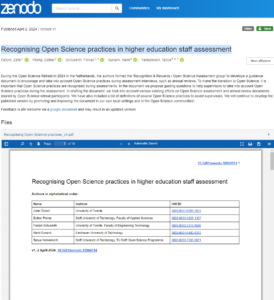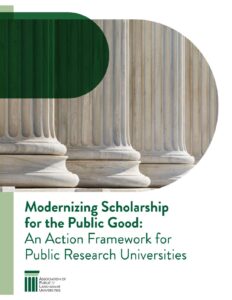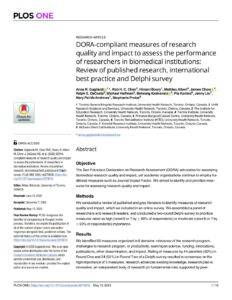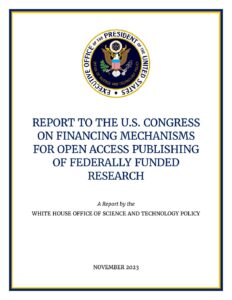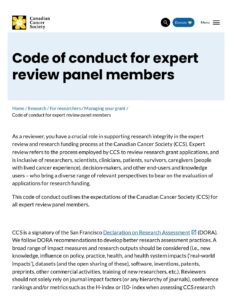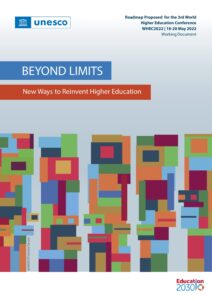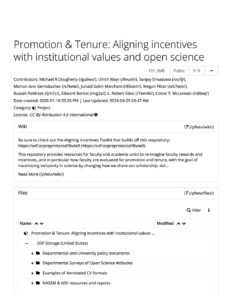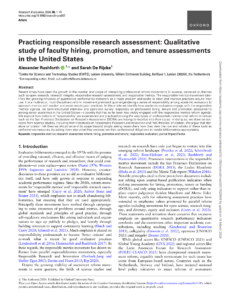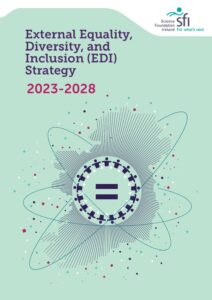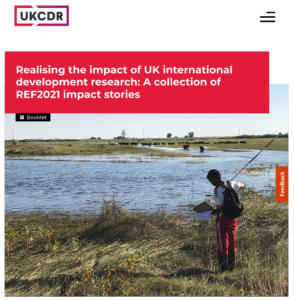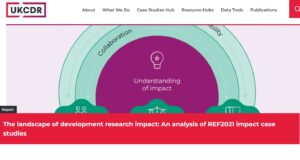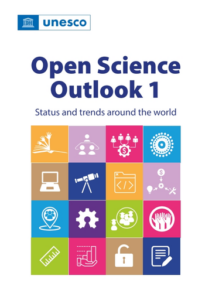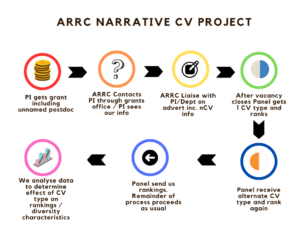A collection of materials to facilitate the development of responsible research and researcher assessment policies and practices.
Search and Filter
Resource type
Intended audience
Case studiesGood practicesInitiativesPolicies and guidance
DORA-produced
Aalborg University (AAU) in Denmark has embarked on an ambitious reform of its research assessment practices, aiming to move beyond traditional journal-based metrics and towards a more holistic and mission-driven approach. As an institution committed to problem-based learning and interdisciplinary collaboration, AAU sought to align research evaluation with its broader strategic goals. With approximately 3,200…
Case studiesGood practicesInitiativesPolicies and guidance
DORA-produced
In January 2021, the University of Calgary was the first Canadian university to sign DORA, cementing an ongoing commitment to societal impact, recognition of diverse forms of scholarship, Indigenous engagement, equity, diversity and inclusion and rigorous assessment and reporting of impact to parties within and beyond the University. The process of implementing DORA has been a…
Case studiesGood practicesInitiativesPolicies and guidance
DORA-produced
The University of Tokyo, established in 1877, is Japan’s oldest and largest national university, with three main campuses: Hongo, Komaba, and Kashiwa. The university’s major research areas span a wide range of disciplines, including natural sciences, engineering, social sciences, humanities, and interdisciplinary fields. In 2023, UTokyo became the first Japanese university to sign DORA. This…
Good practicesPolicies and guidance
For: FundersResearch institutes
2024
This resource compiles questions about open scholarship that pertain to assessment of research, education, outreach, and leadership. The questions for each section are accompanied by definitions of terms used in the questions and links to resources. The authors note that these questions were developed in the context of assessment practices in The Netherlands, but note…
Good practicesPolicies and guidance
For: FundersResearch institutes
2020
This resource compiles questions about open scholarship that pertain to assessment of research, education, outreach, and leadership. The questions for each section are accompanied by definitions of terms used in the questions and links to resources. The authors note that these questions were developed in the context of assessment practices in The Netherlands, but note…
Good practicesInitiatives
For: Research institutes
2023
For over 150 years, public research universities have advanced public interest through education, innovation, and community engagement. The Association of Public and Land-grant Universities (APLU) has created an initiative to promote the continuation of these values while modernizing them to give a greater consideration to diversity, equity, inclusion, and justice. A subsection of this initiative…
Good practicesJournal articles
For: Journals and publishersResearch institutes
2023
This paper reviewed existing literature and international best practices and established consensus by Delphi survey on 10 key measures for assessing research quality and impact that align with DORA values. These measures were chosen from a pool of 50 compiled measures that emphasize diverse and holistic evaluations of research performance beyond traditional metrics like journal…
Good practicesJournal articles
For: Research institutes
2024
This paper examines how to appropriately recognize and reward quality research. It critiques the overreliance on traditional quantitative indicators like journal impact factor and citation counts in evaluating scientific achievements. These metrics often fail to capture the true value and impact of research and can lead to undesirable behaviors that hinder scientific progress. The authors…
Case studiesGood practicesInitiativesPolicies and guidance
DORA-produced
In 2022, the Department of Psychology at the University of Maryland underwent a complete overhaul of their evaluation policies, stemming from their motivation to address reproducibility issues in the field and develop more transparent and inclusive evaluation policies. The department chair began this process with DORA’s principles in mind, working alongside administration, faculty, and a…
Good practicesJournal articles
For: Journals and publishersResearch institutes
2024
This paper explores the relationship between open access (OA) publishing and citation diversity, offering insights into how accessibility shapes scholarly communication. Regarding responsible research assessment, open scholarship is largely important, helping to evaluate work on its own merits when it is openly accessible. The authors determined that freely available scholarly publications attract citations from a…
Good practicesPolicies and guidance
For: Journals and publishersResearch institutes
2023
This report from the White House Office of Science and Technology Policy (OSTP) discusses financing mechanisms for open access publishing of federally funded research. Overall, the report underscores the importance of financing mechanisms to support open access publishing of federally funded research, emphasizing the need for continued efforts to ensure broad access to scientific knowledge…
Good practicesPolicies and guidance
For: Journals and publishersResearch institutes
2023
Reviewers play a critical role in upholding research integrity within the expert review and funding process at the Canadian Cancer Society (CCS). The expert review encompasses a diverse group ranging from researchers, clinicians, patients, survivors, caregivers, decision-makers, and knowledge users, collectively offering a multifaceted evaluation of research grant applications. In alignment with DORA, CCS advocates…
Advocacy resourcesGood practicesPolicies and guidance
For: FundersProfessional societiesResearch institutes
2022
This document from UNESCO is a roadmap for higher education, prepared for the “3rd World Higher Education Conference (WHEC2022).” Within the roadmap are “signposts for co-creating more open, inclusive, equitable and collaborative higher education systems that democratize access and knowledge.” Recognizing the evolution of and advancements in higher education, UNESCO has outlined 5 sections discussing…
Advocacy resourcesGood practicesInitiatives
For: Research institutes
2020
This repository contains resources for faculty and academic units that are working to transform how faculty are rewarded and evaluated for promotion and tenure, with the aim of promoting inclusivity via open science practices. This “Impact as Access” approach entails access to all aspects of research, including data sharing, direct involvement in research, and access…
Advocacy resourcesGood practicesInitiatives
For: Research institutes
2022
The More Than Our Rank scheme and SCOPE Framework for Research Evaluation, launched by the International Network of Research Management Societies Research Evaluation Group (INORMS REG), are initiatives that both have a focus on equity in academia and research. More Than Our Rank aims to address the limitations of global university rankings and encourage academic…
Good practicesJournal articles
DORA-produced
For: Research institutes
2024
This paper investigates the processes and criteria involved in faculty hiring, promotion, and tenure assessments within academic institutions in the United States. Considering the relative size of the United States and its worldwide standing in academic research, there has been less public commitment to reforming research assessment from American research institutions than in similarly positioned…
Good practicesInitiativesTools
For: FundersProfessional societiesResearch institutes
2024
The Young Universities for the Future of Europe (YUFE) Transforming R&I through Europe-Wide Knowledge Transfer (YUFERING) project is a comprehensive initiative aimed at transforming Research and Innovation (R&I) practices across Europe by facilitating widespread knowledge transfer. It seeks to bridge the gap between researchers, innovators, and stakeholders by promoting collaboration and communication through existing networks…
Good practicesInitiativesPolicies and guidance
For: FundersResearch institutes
2023
Science Foundation Ireland’s (SFI) Equality, Diversity, and Inclusion (EDI) Strategy 2023-2028 is centered on SFI’s ambition that “its EDI Strategy will be a key driver of an inclusive, engaged research culture and, through this Strategy, SFI will be an agent of change.” The Agency aims to “lead in minimising barriers and ensuring that everyone has…
Advocacy resourcesGood practicesPosition papers
For: FundersJournals and publishersProfessional societiesResearch institutes
There is a growing recognition that current evaluation metrics often fail to capture the breadth and depth of research impact. In hopes of addressing the reform needed in the research world the Global Young Academy, the InterAcademy Partnership, and the International Science Council have collaborated in conducting a global assessment of research evaluation perspectives. Their…
Good practicesInitiatives
For: Journals and publishersProfessional societiesResearch institutes
Progress towards more responsible research assessment requires implementing and supporting more equitable and transparent standards of practice in the scientific community. Some journals have been considering these changes in how they operate, one of which is PLOS Biology. This article discusses PLOS Biology’s commitment to increasing code sharing and publishing peer review files in 2024…
Good practicesTools
For: FundersResearch institutes
In 2022 Trinity College Dublin launched The Researcher Impact Framework (RIF), a tool designed to help researchers understand and communicate the impact of their work in four key areas: Knowledge generation Development of others and collaborations Contribution to the research community Addressing broader societal challenges The RIF originated from Trinity College Dublin’s Research Impact Pilot…
Case studiesGood practicesPolicies and guidance
For: Research institutes
2023
In this booklet by the UK Collaborative on Development Research (UKCDR) 10 exemplary case studies submitted to Research Excellence Framework (REF2021) are discussed, highlighting international development research by the UK and its non-academic impacts. All 10 case studies are evaluated for how the research at each location was conducted and what the real-world impacts were…
Case studiesGood practicesPolicies and guidance
For: Research institutes
2023
The UK Collaborative on Development Research (UKCDR) conducted an analysis of 891 international development research case studies to identify patterns in the types of non-academic impact that were achieved by studies. This was complemented by 10 case study “deep dives” to better understand the impact of international development research by the UK Higher Education Institutions.…
Good practicesPolicies and guidanceTools
2023
This report by the United Nations Educational, Scientific and Cultural Organization (UNESCO) about open science at the global level reports a growing but uneven adoption of open science practices across regions and disciplines. Persistent gaps in socio-economic, technological, and digital aspects hinder progress, with disparities in access to funding, skills, and tools impeding the realization…
Case studiesGood practices
For: Research institutes
2023
The ARRC team at the University of Cambridge is running a controlled trial to investigate the effects of using narrative CVs in postdoc recruitment. Narrative CVs aim to avoid placing a narrow emphasis on lists of achievements such as authored publications, awarded grants, etc. Using a narrative CV might allow researchers to highlight their wider…





